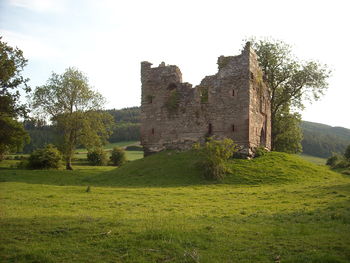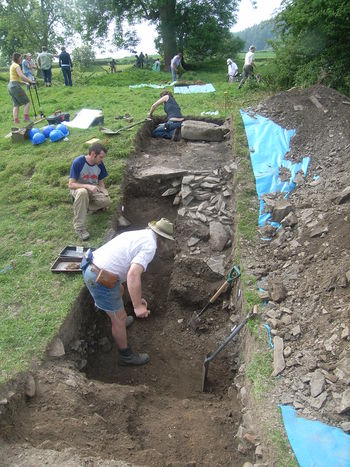Hopton Castle
Hopton Castle is a medieval ruin in Shropshire. It is uncertain when the castle was founded, but it was probably in the 11th or 12th centuries. Hopton Castle's history is poorly documented until the 17th century when it was besieged during the English Civil War. The Royalist besiegers captured Hopton Castle from the Parliamentarian defenders and damaged the castle. The remains were allowed to lapse into ruin, and only a 14th-century tower is left above ground. The site is owned by Hopton Castle Preservation Trust.
History
The castle is first mentioned in 1264, but it may have been founded as early as the 11th century. There are many castles near England's border with Wales, and taken in this context it is likely Hopton Castle was founded before the mid 12th century. The owner of the surrounding area would probably have been responsible for building the castle, though as it is uncertain when Hopton Castle was first built it is equally clear who was responsible. In 1086 a man named Picot de Say controlled the area, but by the middle of the 12th century it was owned by the de Hopton family. It remained with the family until the 15th century. The estate then passed the Corbet family and then the Wallop family, both times through marriage. It remained in possession of the Wallops until the 17th century.[1]
At the outbreak of the English Civil War in 1642, Robert Wallop was a Member of Parliament and supported the Parliamentarian cause against King Charles I and his supporters. However, Shropshire was mostly Royalist territory and it was anticipated that they would assault Hopton Castle. In February Samuel More garrisoned the castle for the Parliamentarian cause, but later that same month Sir Michael Woodhouse commanding the king's men laid siege to the castle. Woodhouse kept a diary which is the main source for the events of the siege. the castle was damaged and in 1655 it was bought by Bartholomew Beale. Ownership descended through his family.[2]
Repairs were carried out in the 1950s and 1960s, though the ruins remained in poor condition. The early 21st century saw an increase in the amount of archaeological fieldwork at the castle, with a geophysical survey in 2005, an earthwork survey in 2006, and excavations by Time Team in 2009.[3][4] Since 2008 the site has been in the ownership of Hopton Castle Preservation Trust. Hopton Castle is both a Grade I listed building and a scheduled monument and is included in English Heritage's 'Heritage at Risk Register'; a sixth of the scheduled monuments in the West Midlands are considered "at risk", and Hopton Castle's state is "very bad".[5]
Layout and architecture
The remains of Hopton Castle are dominated by a 14th-century stone tower on a 2m high mound. Two enclosures known as baileys were part of the castle, however only earthworks now survive.[6] The three-storey tower was built in the late 13th or early 14th century in the style of a Norman great tower called a keep from the 11th or 12th centuries. It survives to a height of 12.2m and is roughly rectangular in plan, measuring 12.2m by 14.1m at its base excluding a projecting tower in the south-west corner. The first floor was probably used as a hall, while the second floor likely provided high-status accommodation.[7]
References
- ↑ Wessex Archaeology (April 2010). Hopton Castle, Shropshire: Archaeological Excavation Report. Salisbury: Wessex Archaeology Limited. pp. 2–4.
- ↑ Wessex Archaeology, Hopton Castle, Shropshire: Archaeological Excavation Report, pp. 5–6.
- ↑ Wessex Archaeology, Hopton Castle, Shropshire: Archaeological Excavation Report, p. 6.
- ↑ "Hopton Castle, Shropshire: investigation history", Pastscape, accessed 3 March 2013.
- ↑ English Heritage (2010). Heritage at Risk Register, 2010: West Midlands, English Heritage, accessed 3 March 2013. pp. 4, 27.
- ↑ "Hopton Castle tower keep castle with outer bailey 150m NW of Park Cottage", Shropshire HER, accessed 3 March 2013.
- ↑ Wessex Archaeology, Hopton Castle, Shropshire: Archaeological Excavation Report, p. 3.

